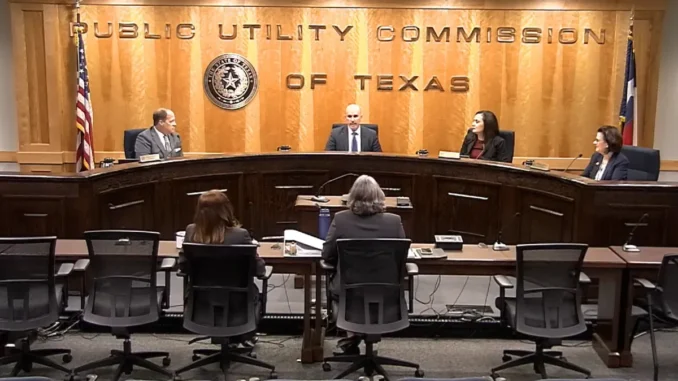
Dive Brief:
- There have been significant reliability improvements made to the Texas electricity grid since Winter Storm Uri in 2021 but the state should still consider new approaches to system recovery including the use of battery storage as a “blackstart” resource, representatives of Texas RE told regulators on Thursday.
- About 82% of blackstart units in Texas failed during Uri, Mark Henry, chief engineer and director of reliability outreach for Texas RE, told the Public Utility Commission of Texas. He was presenting the findings of a December report which concluded the electric power and natural gas sectors should collaborate on a restoration plan.
- Thursday’s meeting was the first with Chairman Thomas Gleeson leading the commission. Gleeson has been with the PUCT for 15 years, most recently serving as executive director. He was appointed by Gov. Greg Abbott last month to lead the commission; he replaces Commissioner Kathleen Jackson, who served as interim chair since June.
Dive Insight:
The Electric Reliability Council of Texas grid was reportedly just minutes away from a total collapse during Uri in 2021, which would have significantly worsened widespread blackouts and extended the recovery period. Ultimately, almost 250 people died in the storm amid rolling blackouts.
The sweeping unavailability of blackstart units “raises some concerns because you would expect those units to be there when things have deteriorated to what is, frankly, an unthinkable condition where the grid could collapse,” Texas RE’s Henry told the commission. Texas RE is the North American Electric Reliability Corp. regional entity for the area served by ERCOT.
Recommendations from the December report include: greater collaboration between the electric and gas sectors; require blackstart resources to perform alternate fuel startup tests; exploration of how gas storage can help with grid recovery; and consideration of inverter-based resources for blackstart applications.
Commissioner Jimmy Glotfelty said he was encouraged by the consideration of alternate resources, specifically batteries and adjacent interconnections.
“As our system grows from 5,000 MW of batteries to 10,000 MW of batteries … if these are viable resources for a blackstart plan we should know about it sooner rather than later,” Glotfelty said. “I hope we can facilitate that discussion, or push [Texas RE] to lead that effort and and work with ERCOT.”
“Adjacent interconnections is obviously a political issue unless they’re DC ties,” Glotfelty noted. The ERCOT grid has minimal interconnection with other regional grids.
Texas RE representatives also updated the commission on their compliance monitoring and enforcement priorities this year, including the reliability of inverter-based resources, cyber and physical security, and inspection of weatherized generation facilities.
“We’re continuing to see cybersecurity vulnerabilities and evolving threats. They’re really evolving at an unceasing pace, which is no surprise,” Joseph Younger, Texas RE vice president and chief operating officer, told the commission.
The PUCT has been working to improve reliability since Uri in 2021 exposed grid weaknesses. The commission on Thursday announced it was closing two projects opened in order to implement improvements, marking the end of the first phase of the commission’s reforms which largely focused on improving operational reliability through weatherization and back-up fuel programs.
“This doesn’t mean we’re done improving the grid. We are continuously looking for ways to strengthen reliability and meet the needs of our fast-growing state. We’re just closing the book on this first chapter,” Gleeson, the comission’s new chairman, said in a statement.
Gleeson has spent much of his career at the PUCT in a variety of roles, including chief operating officer, director of finance and administration, and fiscal project manager. Connie Corona replaces him as interim executive director of the commission. She has worked with the commission for more than a decade, including serving as deputy executive director since 2020. She also previously worked in NRG Energy’s regulatory affairs department.
The PUCT now has four members and one open seat; Commissioner Will McAdams announced his retirement in December.



